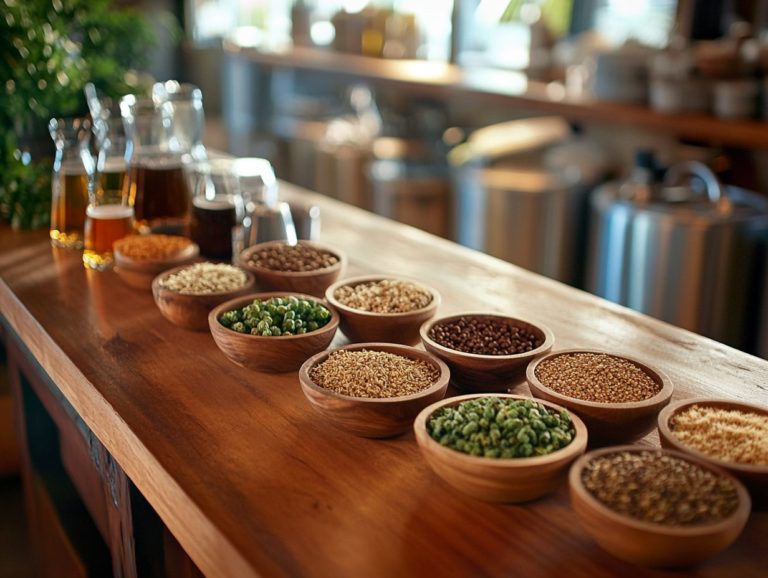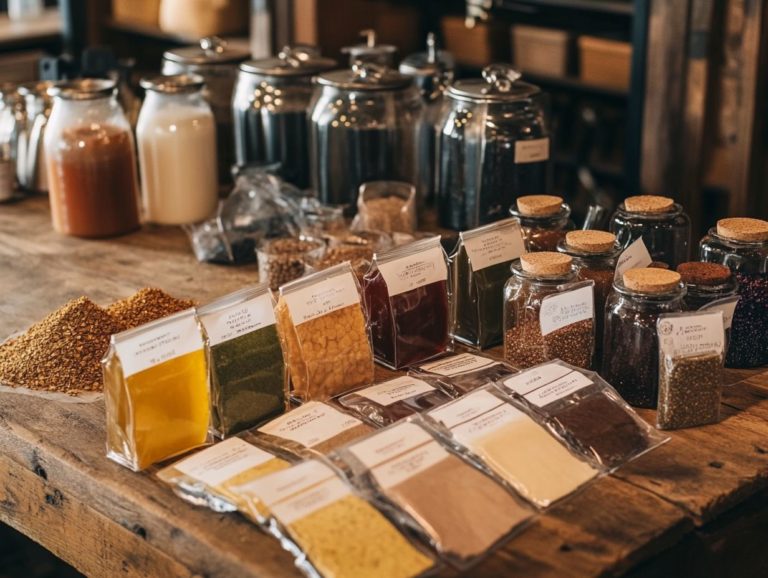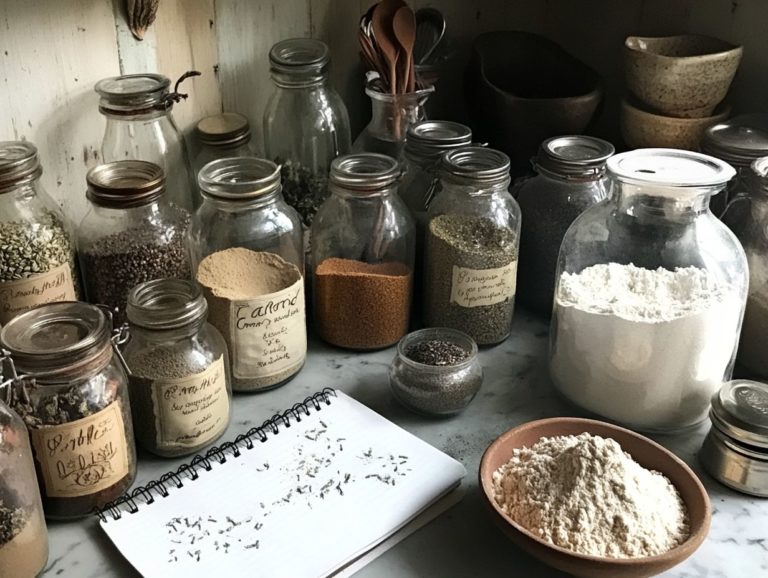Best Additives for Home Brewing: A Complete Guide
Contents
Home Brewing Additives: A Complete Guide
Home brewing is an art form that empowers you to craft your own amazing beers right in the comfort of your own home. This hobby, often referred to as home beer brewing, allows you to explore a myriad of brewing additives that can enhance your final product.
To elevate your brewing game, it’s crucial to understand the various additives at your disposal. From yeast nutrients that enhance fermentation to flavor enhancers that add an exquisite twist, these ingredients can profoundly influence your final product.
This guide delves into the different types of home brewing additives, helping you choose the right ones, offering effective usage tips, and highlighting common pitfalls to avoid. By following this advice, you can ensure that your brewing experience is both enjoyable and successful.
Key Takeaways:
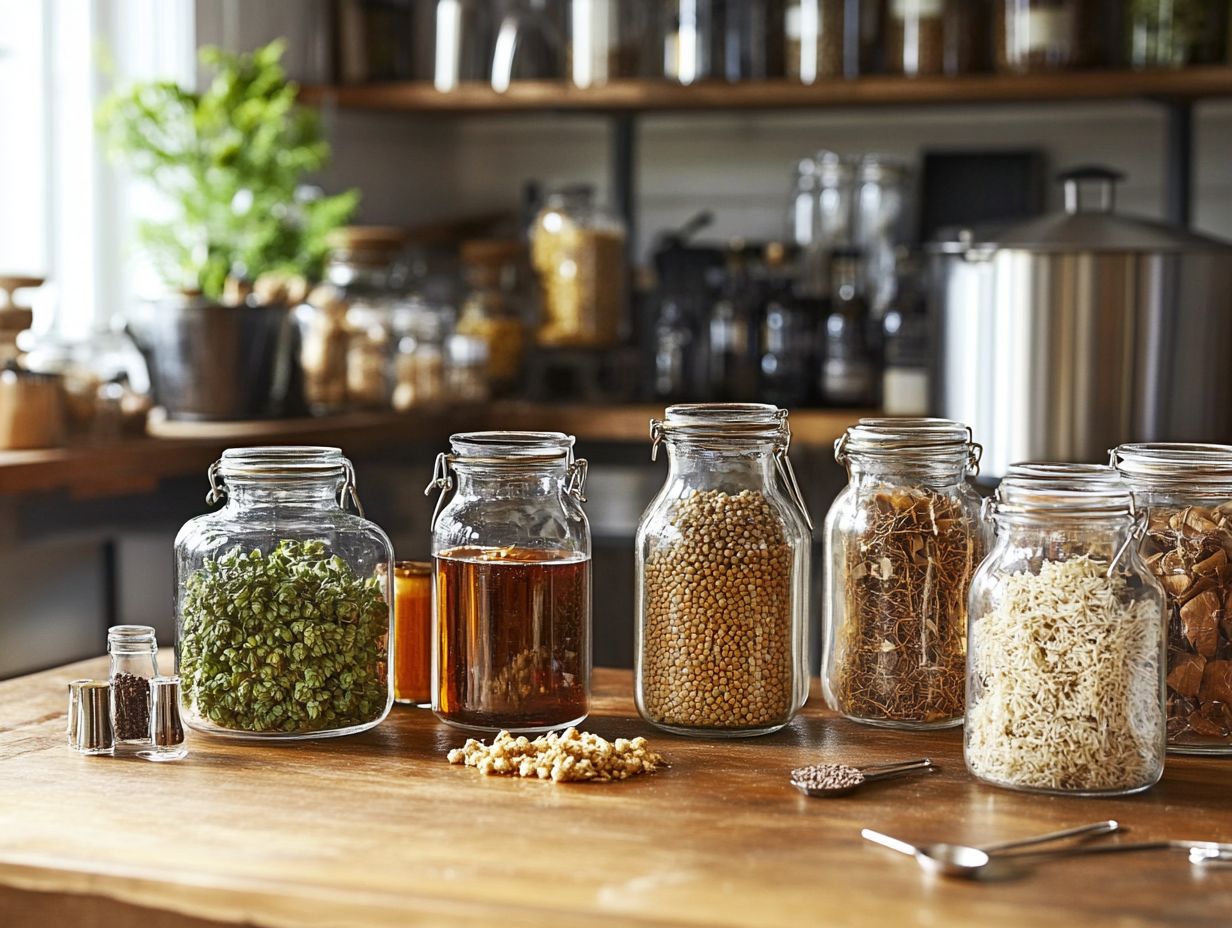
- Consider the type of beer when choosing additives for home brewing. Different types of beer may require different additives for optimum flavor and clarity.
- Always read reviews and recommendations when selecting additives. This can help you avoid common mistakes and choose the best additives for your brew.
- When using additives, follow the instructions on the package and take proper precautions such as sanitizing equipment and measuring accurately. Avoid common mistakes like using too much additive or mixing incompatible ones.
Types of Home Brewing Additives
Home brewing invites you to engage in the meticulous selection of various brewing additives to elevate the quality and taste of your beer. For any aspiring craft brewer, understanding the different types of additives is essential for creating unique and flavorful home brews.
These brewing additives can significantly influence everything from fermentation performance to the clarity of the finished product, ensuring that your beer is not only delicious but also visually appealing.
In this section, you will explore a diverse array of home brewing additives, including yeast nutrients, fining agents, flavor enhancers, clarifying agents, and preservatives.
1. Yeast Nutrients
Yeast nutrients are essential in the brewing process, providing the vital elements needed for robust yeast growth and enhancing fermentation performance. These nutrients are a cornerstone of beer brewing, ensuring that your fermentation process is effective.
Nutrients such as amino acids, vitamins, and minerals boost yeast vitality, ensuring your fermentation runs smoothly. Take diammonium phosphate (DAP), for instance this common additive helps yeast thrive by supplying nitrogen, which is crucial for yeast metabolism. You can also add yeast hulls to support inactive yeast. Other nutrient options include brewing compounds like Super Ferment, which can enhance fermentation performance.
As a craft brewer, consider your specific brewing conditions and yeast strains when choosing the right yeast nutrient. By carefully balancing these elements, you can optimize yeast activity, leading to a cleaner fermentation profile and ultimately crafting beers with richer flavor and aroma characteristics.
Understanding the chemistry behind these nutrients allows you to tailor your brewing approach to meet the unique requirements of your recipes.
2. Fining Agents
Fining agents, like isinglass and gelatin, play a crucial role in brewing, enhancing both the clarity and visual allure of your finished beer. These agents, also known as beer finings, are essential for achieving a clear brew.
Fining agents bind with suspended particles and proteins, enabling them to settle at the bottom of the fermentation vessel, resulting in a beautifully clear liquid. The importance of clarity cannot be overstated; a visually appealing beer significantly enriches your overall drinking experience.
For example, bentonite a clay-based fining agent helps achieve a smooth mouthfeel, while alternatives such as polyvinylpolypyrrolidone (PVPP) specifically target polyphenols that may cloud the beer. By skillfully employing these fining agents, you create beers that are visually inviting and refine the flavors that could otherwise be hidden by haze, ultimately enhancing the enjoyment of every sip.
3. Flavor Enhancers
Flavor enhancers, including specific malt hops, are essential for crafting distinctive flavors and aromas that define your home brewing. They significantly contribute to your beer’s overall profile. Utilizing brewing salts, such as calcium carbonate, can further enhance these flavors.
These enhancements come from a variety of malt hops, each imparting its own unique notes from bright citrusy and floral to rich earthy and herbal. This variety allows you to tailor your creations to different palates, ensuring there s something special for everyone to enjoy.
Different malt types, such as chocolaty, caramel, or roasted malts, play a crucial role in adding depth and complexity to the taste. Balancing the bitterness from hops with the sweetness derived from malts can lead to beautifully layered brews that excite the senses.
By diving into brewing chemistry, you can refine your process. Understanding how to manipulate ingredients like enzymes which help break down sugars and yeast the microorganism that ferments your brew can elevate your creations. This knowledge opens the door to endless flavor combinations, enhancing your home-brewed beer experience.
4. Clarifying Agents
Clarifying agents are essential brewing additives that help remove unwanted particulates from your beer, resulting in a cleaner and more visually appealing product. Clarifiers like isinglass, gelatin, and Irish Moss play a significant role in this process.
Consider agents such as gelatin, isinglass, and bentonite, which operate through various mechanisms to assist in your brewing process. For example, gelatin a protein binds to haziness-inducing particles, causing them to clump together and settle out of your brew. Isinglass, derived from fish bladders, coagulates suspended matter, while bentonite uses its clay-like properties to absorb and eliminate impurities. Clarifying your beer greatly enhances its aesthetic appeal and overall enjoyment.
The interaction of these clarifying agents with your other brewing additives, such as hops and malt, is crucial. Ensure they don t compromise flavor while maintaining clarity, as this balance is key to a polished presentation. The final clarity of your beer enhances its aesthetic appeal and elevates the drinking experience, allowing the full range of flavors to shine through.
5. Preservatives
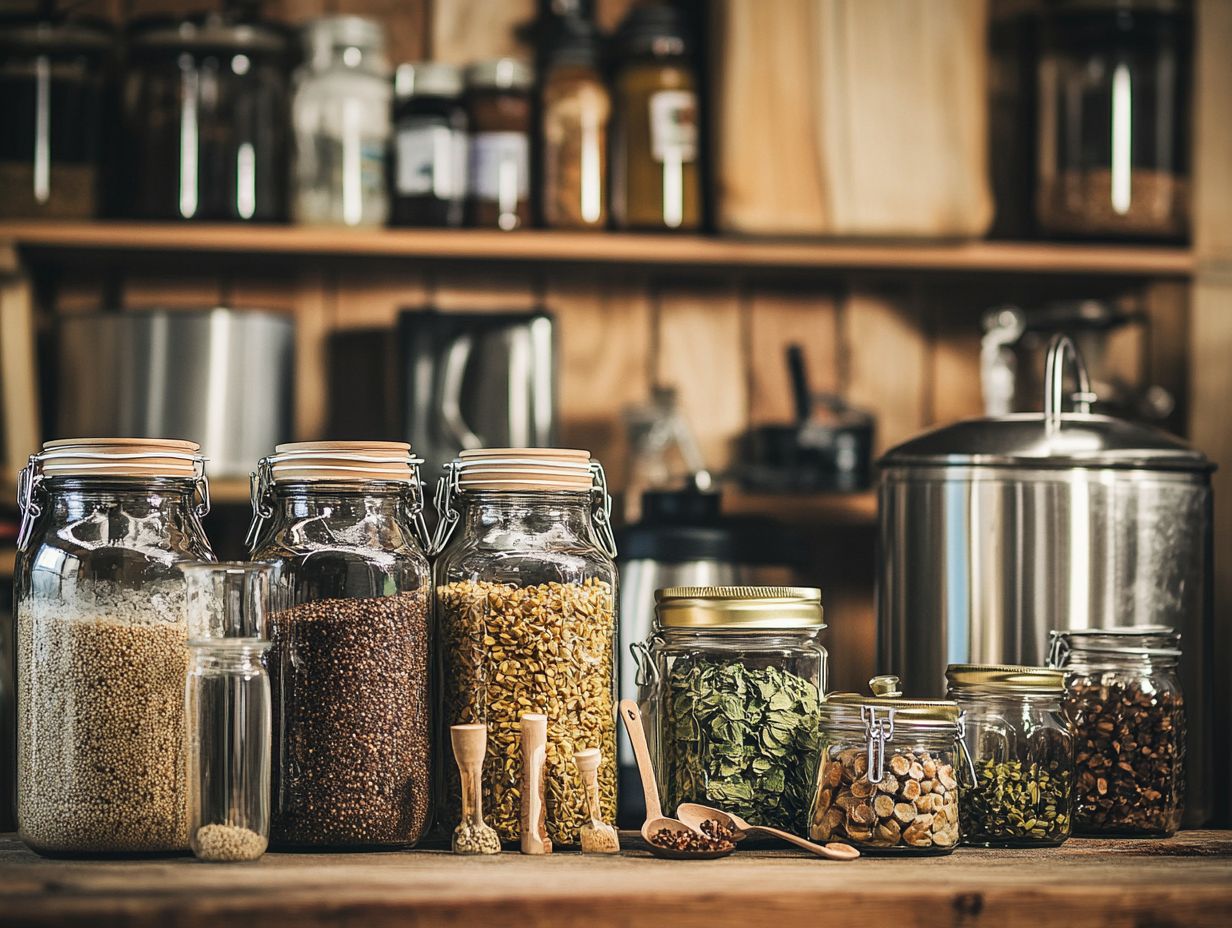
Preservatives like ascorbic acid and sulfites are vital for ensuring the stability and longevity of your home-brewed beer. They effectively prevent spoilage and oxidation. Adding brewing compounds like papain and PVP can also help maintain the quality and freshness of your beer.
These substances serve as protective agents, allowing you to preserve the distinct flavors and aromas that make each batch a unique masterpiece. Ascorbic acid is a powerful antioxidant that neutralizes free radicals, while sulfites inhibit the growth of unwanted bacteria and wild yeast that could jeopardize your brew.
You ll need to find a delicate balance between using just enough preservatives to extend shelf life while preserving the beer’s natural qualities. Utilizing preservatives like calcium carbonate and magnesium sulfate can be particularly effective. By understanding these nuances, you can craft exceptional beers that stay fresh over time and provide a consistently delightful taste experience.
How to Choose the Right Additives for Home Brewing?
Selecting the right additives for your home brewing is essential to crafting the perfect beer that embodies your desired flavor, aroma, and overall quality. This decision requires thoughtful consideration of several factors to ensure your brewing experience yields exceptional results. Adhering to the principles of the Reinheitsgebot, the German Beer Purity Law, may guide your choices to use only the most essential additives like hops, malt, and yeast.
Remember, the choices you make in selecting additives directly impact the flavor profile and overall enjoyment of your beer. Choose wisely to create brews that are not only enjoyable to drink but also a delight to craft.
1. Consider the Type of Beer
Before selecting any additives, consider the type of beer you’re brewing. Each style requires its own unique ingredients.
The ingredients you choose can greatly change the final flavor, aroma, and mouthfeel of your brew. For instance, specific brewing water profiles can enhance a beer style; softer water might highlight delicate notes in a Hefeweizen, while harder water amplifies bold flavors in a stout.
Malt hops are important as different varieties impart unique sweetness, bitterness, or even floral notes. For example, adding orange peel and coriander can elevate a Belgian Witbier.
Understanding these interactions helps you craft a more flavorful and well-balanced brew.
2. Check for Allergies and Dietary Restrictions
When selecting brewing additives, consider allergies and dietary restrictions to ensure your beer is safe for everyone. Be aware of common allergens like gluten in barley and lactose in milk stouts.
Getting to know these ingredients is essential. Explore alternatives that cater to various dietary needs, such as gluten-free grains like sorghum or rice.
Transparency in ingredient sourcing is key. Consumers today value brewers who are open about their ingredient lists, fostering trust and enabling informed choices.
3. Read Reviews and Recommendations
Dive into reviews from experienced craft brewers and beer writers for valuable insights into the best brewing additives. These insights reveal how different compounds influence flavor and overall brew quality.
As an enthusiast eager to enhance your brewing experience, read testimonials to understand how these additives perform in real brewing scenarios. Assessing user experiences helps gauge product effectiveness.
Consider the credibility of your sources. Trusted reviews from knowledgeable brewers and respected forums can guide you in making informed decisions, steering clear of marketing hype.
How to Use Home Brewing Additives?
To effectively use home brewing additives, understand their purpose and incorporate them thoughtfully into your brewing process.
This approach optimizes fermentation performance and flavor, elevating your brewing experience!
1. Follow Package Instructions
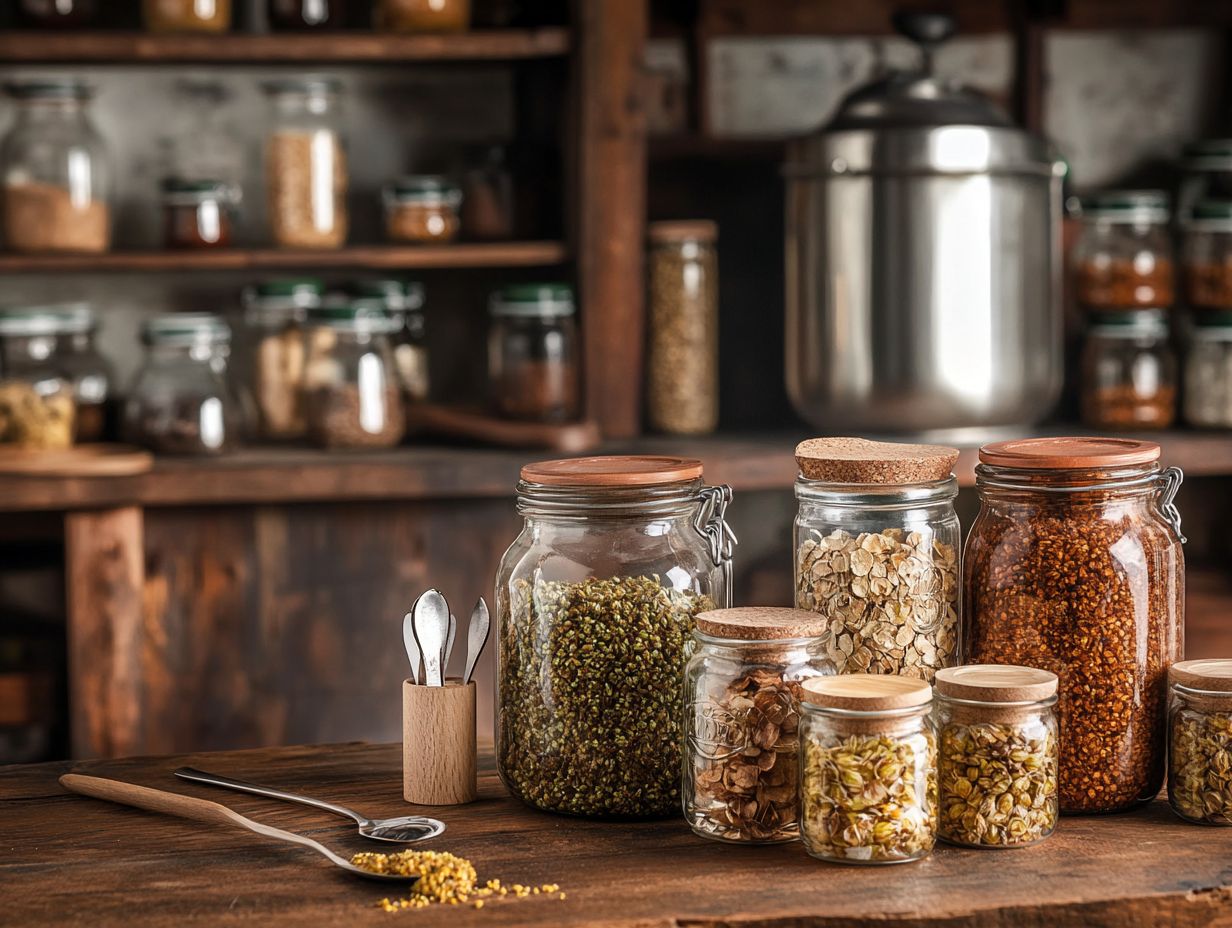
It s essential to follow the instructions provided on the package of each brewing additive to achieve optimal results and prevent mishaps during the brewing process.
It’s crucial to stick to the recommended dosages and methods of incorporation. Many brewers overlook how even minor deviations can significantly impact fermentation performance and the overall quality of their beer.
For example, adding too much yeast nutrient could lead to unwanted off-flavors. Not using enough clarifying agents can cause haze and cloudiness, ultimately detracting from your beer s appearance.
By brewing with care and respecting the guidelines, you can elevate your craft. This ensures that each batch meets your high standards and allows the intended flavors to shine through brilliantly.
2. Sanitize All Equipment
Sanitizing all your brewing equipment is absolutely essential to prevent contamination. This ensures that your brewing additives can perform at their best without any unwelcome interference from pesky microorganisms.
As you embark on your brewing journey, creating and maintaining a sterile environment is crucial. Even the tiniest trace of bacteria or wild yeasts can significantly alter the flavor and quality of your final product.
Cleanliness plays a vital role in fermentation performance, aroma, and stability of your beer. Start by thoroughly cleaning all your tools and surfaces with hot water and a suitable cleaner.
Once cleaned, use sanitizing solutions like Star San or iodophor to ensure every surface is free from contaminants. Let these sanitizing agents dwell for the recommended time to eliminate any lurking pests.
By mastering these practices, you ll pave the way for more consistent and enjoyable brews.
3. Measure Accurately
Accurate measurement of brewing additives is key for achieving consistent results in your home brewing journey. The right balance of brewing water and brewing salts can significantly influence fermentation performance and flavor profile.
Without the proper tools and techniques, even small deviations can lead to unexpected variations in your beer s taste and aroma. Invest in precision scales, calibrated measuring spoons, and specialized refractometers to ensure that every ingredient is accurately quantified.
Understanding the brewing chemistry behind each additive whether it’s hops, malt, or yeast enables you to recognize how these elements interact during brewing. This knowledge enhances the quality of your final product and enriches your overall brewing experience.
Common Mistakes to Avoid When Using Home Brewing Additives
To ensure your beer retains its intended flavor and quality throughout the brewing process, it’s crucial to avoid common mistakes when using home brewing additives. This attention to detail will elevate your brewing experience and yield exceptional results.
1. Using Too Much Additive
One common misstep is the overuse of brewing additives, which can introduce off-flavors and hinder fermentation performance.
When you overestimate the necessity of certain ingredients, it often leads to an imbalance that proves difficult to rectify in the final product. For instance, too many hop additives can create unwelcome bitterness, while excess sugar or caramel color can lead to a cloyingly sweet brew.
To pinpoint the right dosage, start with small amounts and gradually increase based on your specific recipe and desired flavor profile. Keeping detailed notes throughout the brewing process can be incredibly beneficial, enabling you to make informed adjustments in future batches.
Implementing these strategies can significantly enhance the quality and consistency of your brews by helping you understand how different brewing compounds and clarifying additives, like isinglass and gelatin, function.
2. Not Sanitizing Properly
Neglecting to properly sanitize your brewing equipment can introduce contaminants that compromise the quality of your home beer. It is essential to establish a meticulous sanitization routine using solutions like Star San, iodophor, or sulfites.
Contaminants like bacteria and wild yeast can lead to off-flavors and spoilage. These issues can ruin an entire batch of your brew.
For any home brewer, adopting best practices is critical to ensure that all tools, fermenters, and bottles are carefully sanitized before and after each use.
Simple methods, such as using a solution of sodium metabisulfite or no-rinse sanitizers, can be remarkably effective. Soaking your items for the recommended period, ensuring thorough exposure, and rinsing when necessary will help protect against contamination and maintain a clean brewing environment.
Always keep in mind that a clean brewing environment is not just important; it’s the key to brewing exceptional beer that will impress your friends!
3. Mixing Incompatible Additives
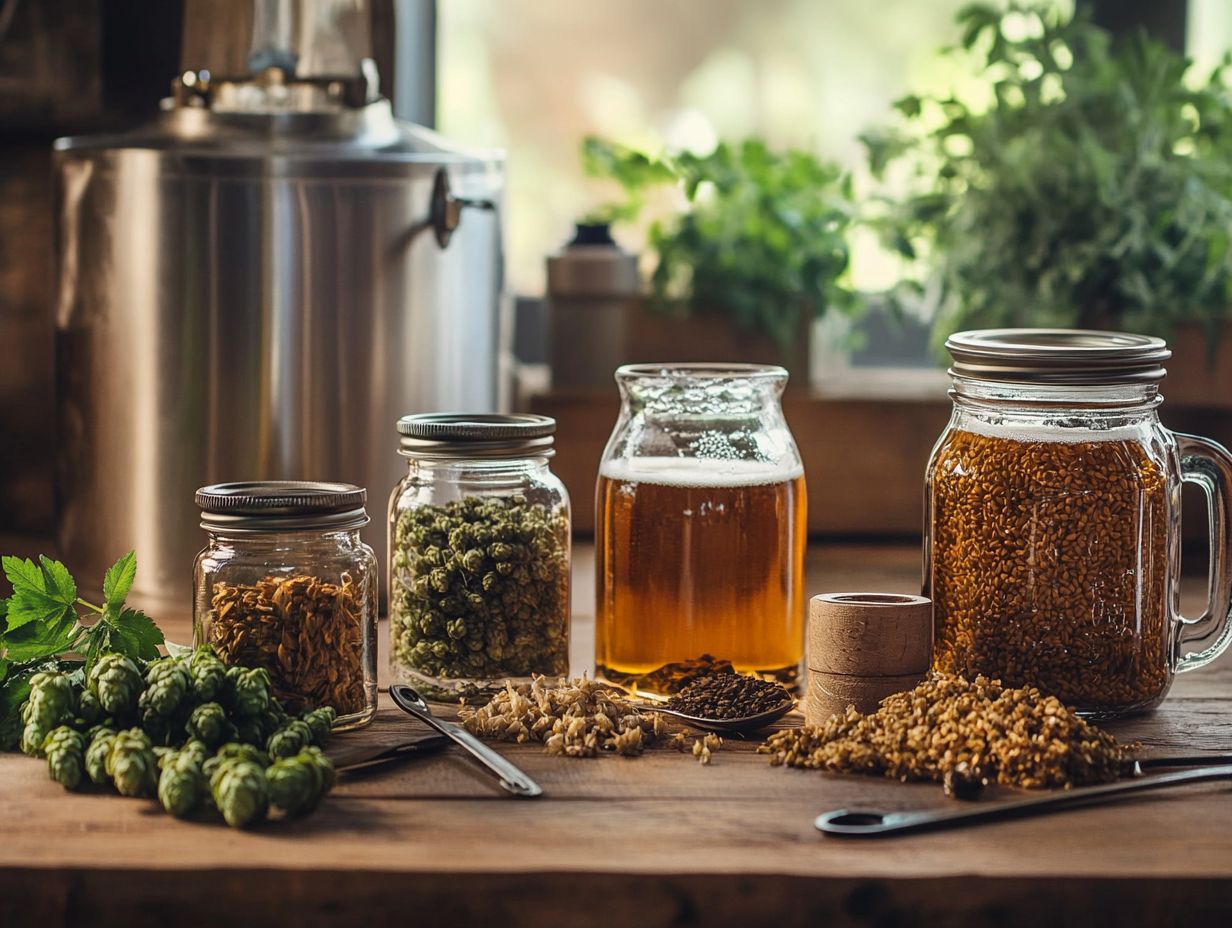
Mixing incompatible brewing additives can lead to adverse reactions that compromise the flavor, clarity, and overall quality of your beer. It is vital for you to understand how different compounds interact with one another.
For example, blending calcium carbonate with certain fining agents can affect the clarity of fermentation. When you combine certain fining agents like isinglass or gelatin with specific yeast strains, you risk diminishing the clarifying benefits you anticipated.
Additionally, you may inadvertently introduce off-flavors that could sour the experience for those eagerly awaiting your brew. Similarly, adding both sodium and calcium salts can throw your water chemistry out of balance, resulting in a mouthfeel that leaves much to be desired.
To ensure your brewing experience is a resounding success, take the time to research safe combinations. Utilizing resources such as brewing forums, educational materials, and consultations with seasoned brewers can provide you with valuable insights into 5 essential additives for home brewing success and effective additive pairings.
This diligence will ultimately enhance fermentation performance and elevate the quality of your finished product by optimizing the use of ingredients used in brewing, such as Burton water salts, gypsum, and magnesium sulfate.
Frequently Asked Questions
What are the best additives for home brewing?
The best additives for home brewing are yeast, hops, malted barley, water, sugar, and spices. You can also include beer finings like Irish Moss and adjuncts like caramel color. These ingredients are essential for creating a great-tasting beer and can be easily found at your local homebrew supply store.
Can I use any type of yeast for home brewing?
Yes, there are different types of yeast that can be used for home brewing, such as ale yeast, lager yeast, and wild yeast. You can add yeast nutrients like ascorbic acid to enhance yeast performance. Each type of yeast will produce a different flavor profile in your beer, so it’s important to choose the right one for your desired brew.
What are hops and why are they important in home brewing?
Hops are the flowers of the hop plant and are used in home brewing to add bitterness, flavor, and aroma to beer. They also act as a natural preservative and help balance the sweetness of the malted barley.
Do I need to use malted barley in my home brew?
Yes, malted barley is a key ingredient in home brewing. It provides the fermentable sugars needed to create alcohol in beer. Without it, your beer will not have the same body, flavor, or alcohol content.
Can I add other ingredients besides the basic additives?
Yes, you can add other ingredients to your home brew to create unique flavors and styles. Some popular additions include fruits, herbs, and spices. Specialty clarifiers like PVP and brewing salts can also be used for finer adjustments.
However, be mindful of the amounts and types of ingredients you add, as they can greatly affect the final taste of your beer.
Is it necessary to use water treatment and brewing additives when brewing at home?
Benefits of Water Treatment
Using water treatment, including brewing salts like calcium carbonate and magnesium sulfate, can greatly improve the quality of your home brewed beer. Brewing salts are minerals added to adjust water chemistry for better beer quality. This process helps remove impurities and adjust the pH levels of the brewing water, resulting in a cleaner and more consistent flavor.
Incorporating yeast nutrients substances that encourage yeast health and beer finings like isinglass or gelatin can significantly enhance fermentation performance and clarity in fermentation. Don’t miss out on the opportunity to elevate your brewing game!



